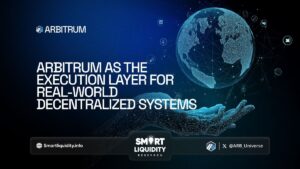How Arbitrum Could Revolutionize Real-World Asset Tokenization


How Arbitrum Could Revolutionize Real-World Asset Tokenization! In the fast-changing realm of decentralized finance (DeFi) and blockchain, tokenizing real-world assets is a highly promising trend. Tokenization transforms physical or financial assets, like real estate, art, or bonds, into digital tokens that live on a blockchain.
This innovation offers new ways to democratize access to investments, improve liquidity, and reduce costs associated with transactions. One key player in this revolution is Arbitrum, a Layer 2 scaling solution built on Ethereum that’s gaining recognition for its scalability, efficiency, and security.
What is Arbitrum?
Arbitrum is an Ethereum Layer 2 solution that aims to scale smart contracts and make transactions faster and cheaper without compromising security. Built on a technology called Optimistic Rollups, Arbitrum significantly reduces the congestion and high fees often associated with Layer 1 Ethereum. It allows users to engage in more affordable and quicker transactions, providing a highly scalable infrastructure for decentralized applications (dApps).
In the context of real-world asset tokenization, Arbitrum’s scalable architecture and secure environment make it an ideal platform to bring the vision of tokenized assets to life.
The Promise of Real-World Asset Tokenization
Tokenization allows individuals to convert tangible assets into digital assets that can be stored and traded on blockchain platforms. For example, through tokenization, ownership of a luxury real estate property could be divided into digital shares, allowing multiple investors to hold fractional ownership. Similarly, art, gold, or even bonds can be tokenized, turning previously illiquid or expensive assets into accessible investment opportunities.
This paradigm offers several key benefits:
- Increased Liquidity: Illiquid assets like real estate or fine art can become liquid by fractionalizing ownership, allowing easier buying, selling, or trading.
- Global Accessibility: Blockchain allows global, borderless transactions, enabling anyone with internet access to invest in tokenized assets.
- Lower Costs: By cutting out intermediaries and automating processes via smart contracts, transaction costs are significantly reduced.
Arbitrum’s high-speed, low-fee platform enhances these benefits, especially in making it easier for average investors to participate in markets traditionally reserved for institutional players.
How Arbitrum Plays a Key Role
Arbitrum’s ability to scale Ethereum makes it a perfect environment for tokenizing assets on a blockchain. Here’s how Arbitrum could lead the charge in real-world asset tokenization:
- Low Transaction Fees
One of the major pain points for tokenized assets is the cost of executing transactions on-chain. Arbitrum, with its lower gas fees compared to Ethereum, can make the tokenization and trading of real-world assets more economically feasible, particularly for small investors. - Enhanced Security
Security remains a crucial concern when dealing with high-value real-world assets. Arbitrum inherits Ethereum’s robust security framework but operates on Layer 2, reducing risks associated with congested networks or high fees. This secure environment ensures that ownership and asset transfer can be trusted by both individual and institutional investors. - Interoperability
Arbitrum supports Ethereum-based tokens, making it easy for assets to be transferred or integrated with the broader DeFi ecosystem. This interoperability is key to ensuring the wide acceptance of tokenized assets, as investors need the ability to trade, use, or leverage these assets in DeFi applications. - Fast Transactions
Speed is essential in financial markets, especially for investors looking to take advantage of time-sensitive opportunities. Arbitrum’s ability to process transactions at a higher speed than Ethereum enables real-time trading and asset management in tokenized markets.
Real-World Use Cases
- Real Estate
Tokenized real estate offers the chance for fractional ownership, enabling retail investors to hold a portion of properties around the world. Using Arbitrum, these transactions could be processed with lower costs and at higher speeds, making it easier for everyday investors to enter the real estate market. - Art and Collectibles
High-value assets like art are typically illiquid, but tokenization makes it possible to split ownership into tradable tokens. Arbitrum’s fast and cheap transactions make it feasible to buy or sell these tokens without significant overhead. - Commodities
Gold and other commodities could be tokenized, enabling investors to trade these tokens across the globe seamlessly. With Arbitrum, these trades can happen instantly, with significantly lower costs than traditional commodity trading platforms. - Debt and Equity Markets
Bonds, stocks, and other securities can also be tokenized. Arbitrum provides a secure and scalable platform for decentralized trading and holding of financial instruments, circumventing traditional market barriers.
The Future of Tokenization with Arbitrum
The future of tokenized assets is bright, and Arbitrum is poised to play a central role in this ecosystem. Arbitrum offers an efficient, scalable, and secure solution for developers and companies to tokenize and trade real-world assets like real estate, fine art, and government bonds. It also aims to lower costs, enhance liquidity, and democratize investment access.
As adoption grows, the role of Arbitrum in the tokenization revolution will likely expand, offering new opportunities for both investors and asset owners. As more industries explore blockchain as a means of asset representation and trading, Arbitrum is also positioned to be at the forefront, facilitating secure, fast, and cost-efficient transactions.
In Summary
The tokenization of real-world assets is a significant advancement in blockchain and DeFi, with Arbitrum positioned to lead. Its scalable technology offers the infrastructure to transform asset tokenization, creating new markets and investment opportunities globally. By removing traditional barriers and enabling secure, low-cost transactions, Arbitrum may unlock the full potential of tokenized assets.




